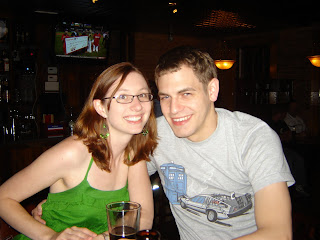When Justin and I started talking about engagement, and looking at rings online we had fun looking at a wide range of things. I felt strongly about wanting a conflict-free gemstone, and about not spending too much money. We quickly learned that I
 couldn’t have both those things and also have a diamond. More shopping and some serendipity led us to a sapphire in a beautiful filigree setting that was already just my size, which I love.
couldn’t have both those things and also have a diamond. More shopping and some serendipity led us to a sapphire in a beautiful filigree setting that was already just my size, which I love.The more we shopped for women’s rings, the more I wanted one. But one day Justin brought up how him giving me an engagement ring didn’t seem to represent our relationship very well. I agreed that the engagement ring tradition seems linked to traditions of status and marking ownership of a woman that doesn’t sit well with the way we see our relationship. But we were having so much fun shopping!
 So we started looking for men’s rings. We wanted something that didn’t necessarily look like a wedding band, but that was still elegant and manly. We were excited when we found a designer on etsy who lives in Athens, GA whose work we loved, and I got Justin a ring in silver that we might replace with gold or platinum for our wedding bands.
So we started looking for men’s rings. We wanted something that didn’t necessarily look like a wedding band, but that was still elegant and manly. We were excited when we found a designer on etsy who lives in Athens, GA whose work we loved, and I got Justin a ring in silver that we might replace with gold or platinum for our wedding bands.Like a lot of the choices we are facing in our relationship, I’m happy with both of us having rings because it honors some of the elements of the tradition that I like: signifying our commitment in a way other people will be able to see and understand, honoring each other with a pretty gift. But it avoids some of the problems: irresponsible spending, unequal giving.
When I lay it out this way, it feels like a silly thing to spend so many pixels on. But I like that we made a few small unusual choices, and that they are weird enough that they sometimes bring up questions, which allows us to talk about our values.


